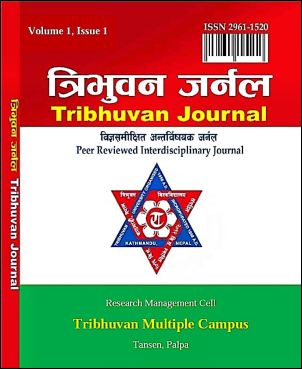Oil Politics and the Environmental Crisis in Galeano’s Open Veins of Latin America: Five Centuries of the Pillage of a Continent
DOI:
https://doi.org/10.3126/tribj.v1i1.53498Keywords:
Capitalist cartels, Lake Maracaibo, petroleum politics, environmental crisis, ecologyAbstract
The politics of oil has played a vital role for the massive exploitation of Venezuela’s natural resources such as the petroleum products. When the European colonizers entered into the Latin American countries in the sixteenth century, initially they took hold of the land and the people; later, they pillaged and exploited their natural resources together with the American capitalist cartels. This paper analyzes the petroleum politics that includes the European and American oil cartels that has adversely affected environment in the region. In this paper, I have explored the western capitalists’ petroleum politics in Eduardo Galeano’s book Open Veins of Latin America: Five Centuries of the Pillage of a Continent. Mainly I have focused on the case of Venezuela’s Lake Maracaibo, where a continuous spilling of oil has brought a huge damage to different water species; for instance, fishery is on the verge of collapse and the surrounding is severely affected. The craving of capitalist alliances for the petroleum products has ignored the fact that humans have to pay the cost of environmental destruction as a result of the oil politics. The paper sheds light on the environmental crisis, which is caused by continuous extracting and spilling of oil in Lake Maracaibo. Subsequently, the Venezuelan prosperity has got threatened as it totally relies on the ‘oil culture’. To explore the widespread ecological damage on Lake Maracaibo and its surroundings, I have used the deep ecological concept of Arne Naess, which argues that there is the connectedness and dependency of living and non-living things with each other so that any disturbance can hamper the whole ecosystem. Besides Naess’s ecological concept, I have also drawn ideas from the insights of ecocritics Cheryll Glotfelty and Val Plum wood to support Naess’s ecological concept and to clarify the conceptual framework of this paper.




